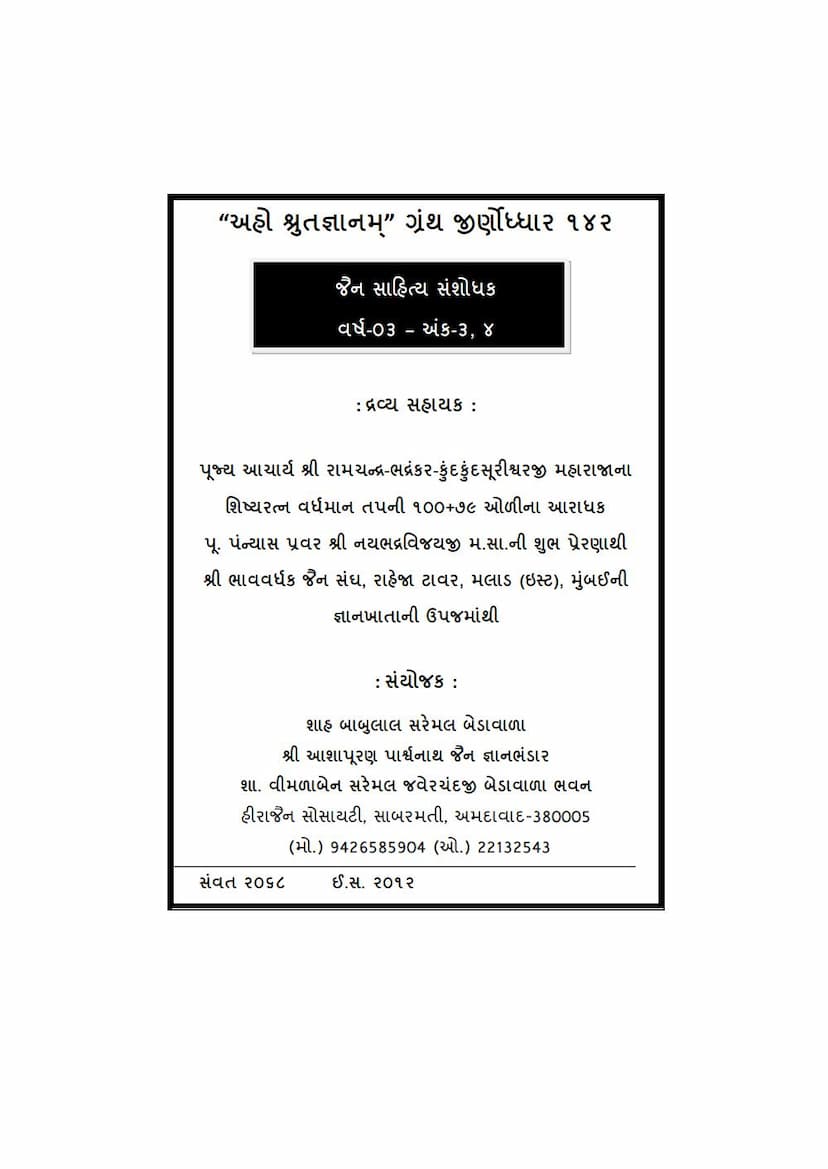Jain Sahitya Sanshodhak Khand 03 Ank 03 To 04
Added to library: September 2, 2025

Summary
This Jain text, "Jain Sahitya Sanshodhak Khand 03 Ank 03 to 04," compiled by Jinvijay and published by Jain Sahitya Sanshodhak Samaj Pune, is a quarterly journal focused on Jain history, literature, and philosophy. The provided pages cover several significant articles and discussions relevant to Jain studies:
Key Themes and Articles:
- "Aho! Shrutgyanam" (Oh, Sacred Knowledge): This recurring theme highlights the journal's commitment to preserving and disseminating Jain scriptural knowledge, often in the context of restoring or making available old and rare texts.
- Jain Literature and Texts: The journal lists and discusses numerous Jain scriptures, commentaries, and scholarly works, often indicating their authors, translators, and page counts. This includes ancient texts on architecture, astrology, grammar, logic, poetry, and philosophy.
- "Satyapuriy Shri Mahavir Utsah" (The Enthusiasm of Shri Mahavir of Satyapur) by Dhanpal: A significant portion of the text is dedicated to this work, which is described as a commentary or eulogy in Apabhramsha. The journal provides the original text and an extensive introduction and commentary by Shri Bechardas Jivraj. This section delves into the historical context of Satyapur (modern Sachor), its significance as a Jain pilgrimage site, and the miraculous stories associated with the Mahavir idol there.
- Historical Context and Legends: The articles explore historical events and legends connected to Jainism. This includes discussions on:
- Mahmud Ghazni's invasions and his interaction with Somnath and other important sites, linking it to potential attacks on Jain temples and idols.
- The significance of idol worship (Murti Puja) and its philosophical underpinnings.
- The life and times of great Jain poets and scholars like Dhanpal and Haribhadra Suri.
- Haribhadra Suri's Life and Works: The journal features a detailed introduction to Haribhadra Suri, a prominent Jain scholar. It discusses his time period, his conversion to Jainism, and his extensive literary contributions, including the famous "Samarāiccakahā" (The Tale of Samarāicca). The discussion highlights the intellectual exchanges Haribhadra had with contemporary scholars of other religious traditions, like Buddhism and Brahminism.
- The Mahānishītha Sūtra: A significant portion is dedicated to introducing and analyzing the Mahānishītha Sūtra, a key scripture in the Cheda Sutras. The article discusses the differing opinions among various Jain sects (Gachhas) regarding its authenticity and content, particularly its references to temple worship and the differing views of ascetic practices. It also highlights the detailed explanation of its various chapters and the efforts of scholars like Poet Deep Vijayji in making its contents accessible.
- The "Kaduā Mat" (Kaduā Doctrine) and its Pāṭṭāvali (Genealogy/Succession): This section explains a specific, lesser-known Jain sect or practice called "Kaduā Mat," founded by Sa Kaduā. The article discusses their beliefs, which seem to involve a different approach to asceticism and monastic life, possibly a reinterpretation or adaptation due to the prevailing social conditions. It also details the succession of leaders within this lineage.
- Ujjain Jain Sangha's Petition: A letter from the Jain community of Ujjain to Acharya Shri Vijayaprabh Suri is presented. This petition relates to arrangements for the Chaturmas (monsoon retreat) and highlights the importance of seeking guidance from spiritual leaders. It also mentions the contributions of other significant figures like Upadhyay Shri Vinayvijayji.
- Jain Philosophy and Theology: Discussions on core Jain philosophical concepts are included, such as:
- Sutragen and Virodhabhas Alamkara: The journal examines the use of linguistic and rhetorical devices like Sutragen and Virodhabhas Alamkara in Jain devotional literature.
- Jain Tatva Charcha (Discussion on Jain Principles): This section explores specific philosophical questions:
- The debate on whether women should be allowed to study the Drishtivada scripture, examining arguments from both logical and scriptural perspectives.
- The concepts of "Avyavahāraraśi" (non-transactional category) and "Vyavahāraraśi" (transactional category) of souls, questioning their empirical basis and scriptural validity.
- Questions regarding the nature of the universe, the movement of celestial bodies, and the discrepancy between Jain cosmological models and modern scientific understanding.
- The Concept of Dharma and Adharma: The text delves into the Jain understanding of Dharma (that which facilitates motion) and Adharma (that which facilitates rest) as fundamental substances, explaining their nature, function, and pervasive presence in the universe. It also touches upon the philosophical debate surrounding their existence and purpose, and their role in maintaining cosmic order.
- Khāravela's Inscription: A significant portion is dedicated to deciphering and explaining the Kharavela inscription from Hathigumpha. This article emphasizes the importance of epigraphy in understanding ancient Indian history, particularly Jain history, and highlights the efforts of scholars in translating and interpreting these inscriptions. It discusses Kharavela's lineage, his reign, his patronage of Jainism, and his military campaigns, drawing parallels with other historical figures and texts.
- The Ājīvika Sect: A detailed article by A. F. R. Hoernle, translated into Gujarati, discusses the Ājīvika sect, its founder Goshala Maskariputra, and their philosophical tenets, particularly their doctrine of Niyati (determinism). It compares and contrasts Ājīvika beliefs with those of Jainism and Buddhism, highlighting their unique aspects and historical context.
Overall Significance:
This volume of "Jain Sahitya Sanshodhak" serves as a valuable resource for researchers and enthusiasts of Jainism. It demonstrates a commitment to scholarly research, textual analysis, historical investigation, and philosophical discourse within the Jain tradition. The inclusion of both original Jain texts and scholarly commentary, along with translations and discussions of historical figures, makes it a comprehensive academic publication. The journal also highlights the efforts of institutions and individuals dedicated to the preservation and promotion of Jain literature and knowledge.